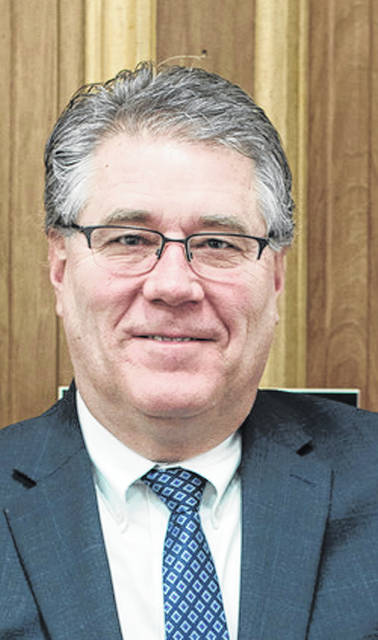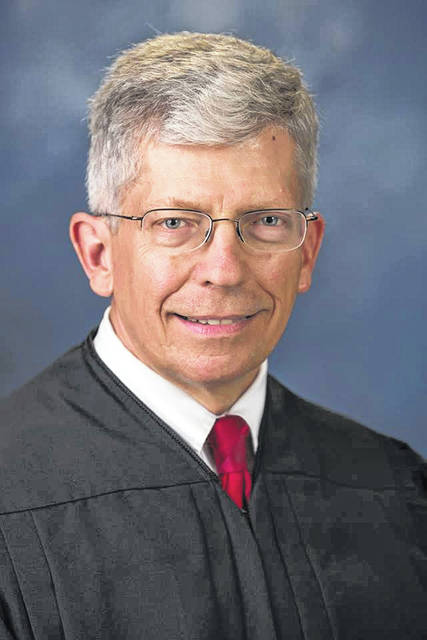

SIDNEY — Two candidates are seeking the Republican nomination in the Sidney Municipal Court judge race. Gary J. Carter, of Anna, and Steven J. Geise, of Sidney, face off Tuesday, May 7, in the Primary Election. The winner will face incumbent Judge Duane Goettemoeller in the November election.
Carter is a graduate of Wright State University where he received a Bachelor of Arts in Education. He received his Juris Doctor from the University of Dayton, School of Law.
He is the magistrate of the Shelby County Common Pleas Court. This is the first time he has run for public office.
He and his wife, the former Pam Westerheide, are the parents of two sons, Matt and Luke.
Geise is a 1979 graduate of Lehman Catholic High School. He received his Bachelor of Science in Business Administration from The Ohio State University in 1983 and Juris Doctor from Capital University Law School in 1994.
Geise is an attorney and is a solo practitioner. He is a partime magistrate with the Shelby County Juvenile Court. This is the first time he has run for public office.
He and his wife, the former Julie Paullus, are the parents of two adult children.
Each candidate was asked the same questions about his qualifications and why he is running for Sidney Municipal Court judges. The following is the questions and their answers with responses alternating on each question.
Why do you feel you are qualified to be the Sidney Municipal Court Judge?
Geise: I am qualified because I have experience as a magistrate in Juvenile Court and I have experience as a practicing attorney. As a part-time public defender I represented criminal defendants in Municipal Court and in my private practice I represented clients in civil and criminal cases before the court. As a magistrate of over two years, I hear civil custody, child support and Children Services cases. This has given me the perspective to address the challenges within our community. Working on Children Services cases has given me a firsthand look at the drug and crime issues facing Shelby County.
Carter: As Common Pleas Court magistrate for over 28 years and having served as Juvenile Court magistrate for five years, I have handled thousands of cases, including initial appearances, detention hearings, traffic cases, contempt hearings, property disputes, and domestic violence protection orders. As an assistant prosecutor in Darke County, I handled traffic cases and misdemeanors. I have both prosecuted and defended evictions. These experiences involve issues that frequently arise in Municipal Court. My qualifications also include being mentored by some of Shelby County’s finest judges.
What do you consider to be the biggest challenge of being a judge?
Carter: After 28 years as a magistrate, there’s not a lot that I haven’t seen. However, every now and then I get a case with an unusual fact pattern that may require some research to see if a case like it previously occurred somewhere else in Ohio. If so, I need to examine how that court dealt with it. If not, I simply determine the facts of the case in front of me and apply the law to those facts.
Geise: Time management and communication are the biggest challenges of being a Judge. I have experience with time management, having been able to effectively manage my caseload as a solo practitioner, while at various times working part-time positions as a magistrate, public defender and solicitor for the village of Anna. Communication is equally important because there are a large number of Municipal Court personnel, various offices and parties who come before the court that a judge coordinates with. I will focus on communicating effectively and respectfully with all personnel and those coming before the court.
What are your goals for office if you are elected?
Geise: Consistency, efficiency and civility. All parties and representatives in a case should know the Court is going to be consistent in its decisions, which I would strive to do. Courts generally run behind schedule and parties have to wait for decisions. My goal is to run the court as efficiently as possible, to respect everyone’s rights and to administer justice equitably. Civility in the courtroom is a necessity. As judge, I would do everything in my power to see that parties and counsel are heard in a civil manner and everyone in the courtroom is treated with respect.
Carter: My primary goal is to be a fair and impartial judge, who runs a smooth and efficient court. Everyone who comes into my court will be treated with courtesy and respect, and cases will be handled in a consistent and professional manner.
Specific goals include finding creative ways to reduce the drug abuse problem in Shelby County. Another goal is to reduce the number of repeat offenders and keep them from moving up to more serious crimes. Lastly, I would draw attention to the problem of distracted driving, in order to reduce the number of accidents caused by it.
What do you consider your three most important accomplishments?
Carter: I am consistent in my decisions, so that attorneys know what to expect, and how to advise their clients.
My decisions have been affirmed by the Third District Court of Appeals, and in a decision that went all the way to the Ohio Supreme Court, I was unanimously affirmed. That decision established a binding precedent for every court in Ohio. See, 82 O.S.3d 397 (1998).
On a personal level, my most important accomplishment is being a good husband to Pam, my wife of almost 30 years, and a good father to our two grown sons, who are both Eagle Scouts.
Geise: First is my family, I have been married for 30 years and together we have raised two children in the community where I grew up. Second, would be running a successful solo practice since 2006, which has given me the opportunity to be a leader and a small business owner. Finally, earning my law degree while working a full-time job and raising a family, which required a lot of time management, long hours and a supportive spouse.
There’s been a long term debate on whether drug addiction is an illness or a crime. What is your stance on this situation? And based on your stance would you change any current sentencing laws? If so, how would you change them.
Geise: Drug addiction is an illness and the use of certain drugs can be a crime. Drug use may lead to ancillary crimes, which affect innocent people such as impaired driving, theft, domestic violence, assaults, rapes and other serious crimes. The sentencing laws already give judges broad discretion to order drug and alcohol assessments, counseling and mandatory drug testing along with possible jail time. The key is knowing how to use these tools when sentencing based on the specific facts of the case. Having experience in criminal law I am prepared to make fair and equitable decisions.
Carter: Physicians determine if an individual has an illness. The courts become involved if the drug being used is an illegal substance. Judges must uphold the law, and an individual who breaks the law by using an illegal substance, can expect to face sentencing.
Judges are not in a position to change current sentencing laws. The legislature makes the laws. The courts interpret them. Judges do have discretion under current sentencing laws, and I would use the court’s discretion to make good use of the “Star House,” a transitional treatment facility for inmates who have addictions and have completed their sentence.
How do you feel the court system will be affected by the legalization of medical marijuana in the state of Ohio?
Carter: The legalization of medical marijuana has created another class of prescription drugs in the State of Ohio. Prescription drugs often contain warnings about side effects and possible impairment, such as the inability to drive or operate machinery safely. Most people follow these warnings, but some do not. Driving while impaired is still a crime, punishable by the court system. The courts have handled these cases in the past and will continue to do so.
Geise: Like any new law it remains to be seen the type of cases that will be brought before the court. The court will have to address these issues as they arise, considering marijuana’s legal and illegal uses. I will work hard to stay informed as medical marijuana laws take effect and are enforced.



